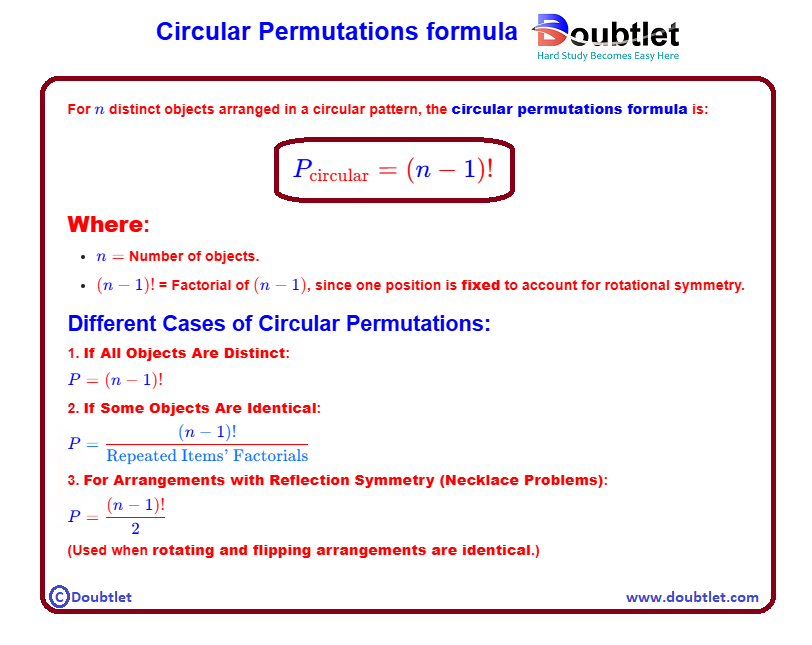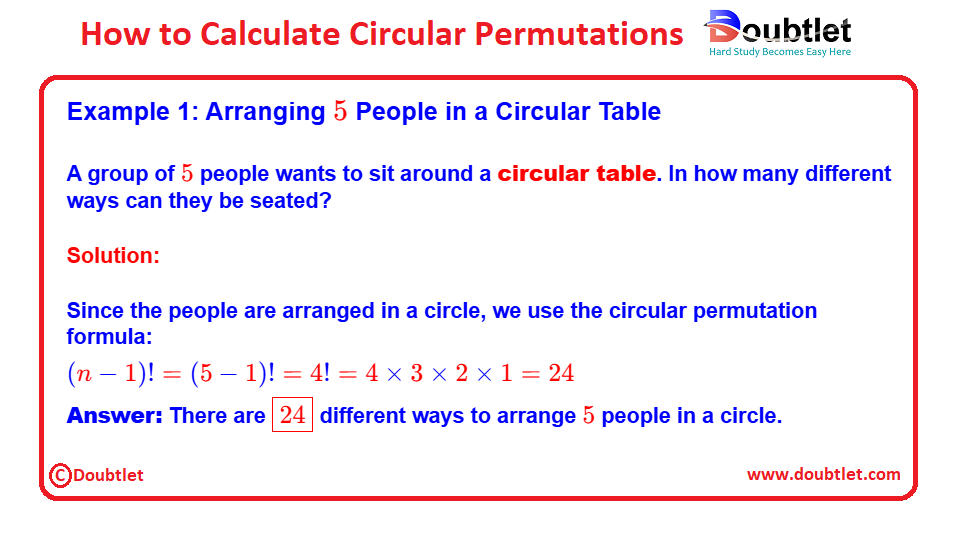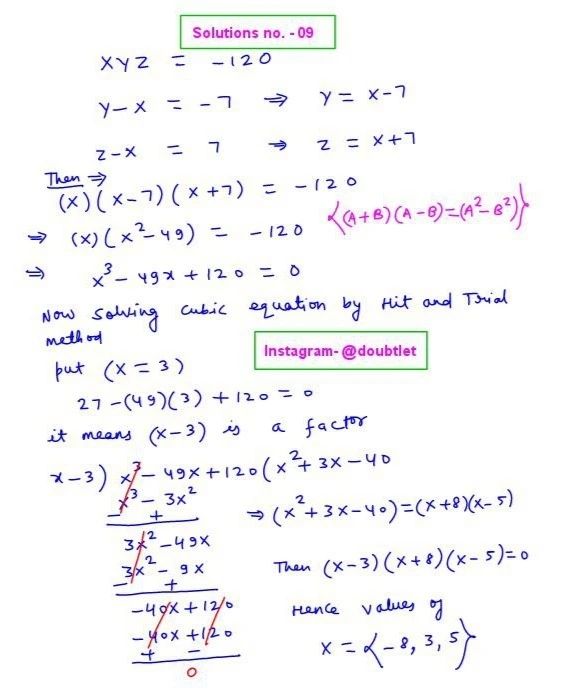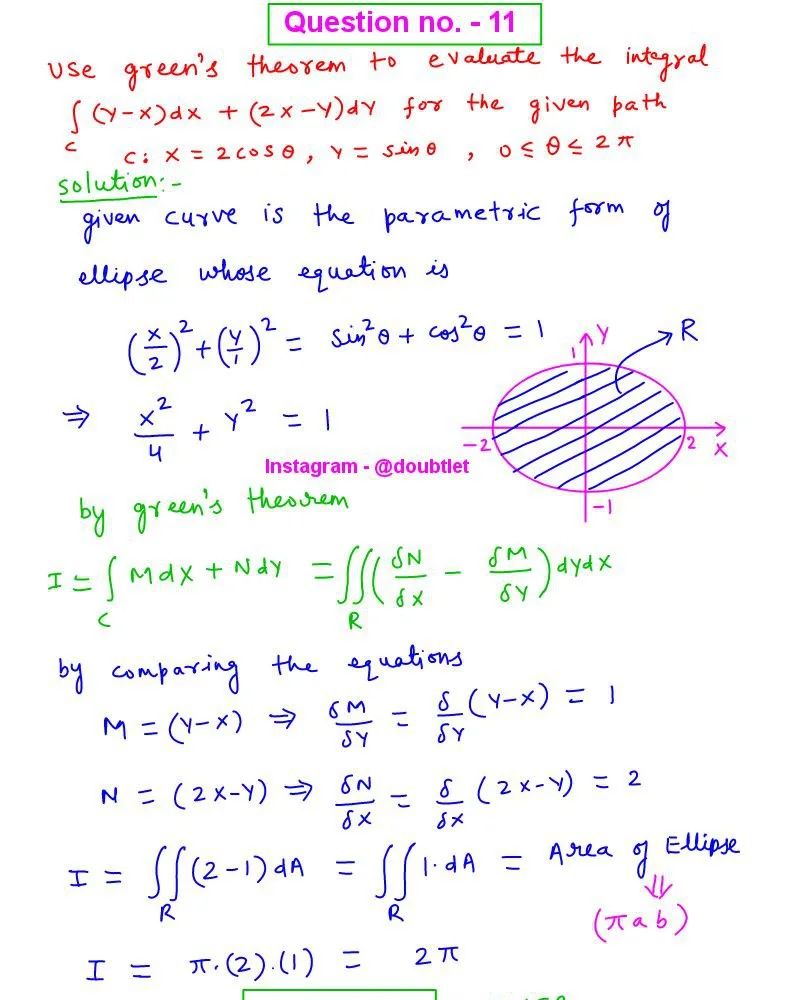









Circular Permutations calculator
This calculator will help you to calculate the number of possible permutations or arrangements of n different things taken all at a time with the steps shown.Related Calculators:Permutations calculator

Neetesh Kumar | March 11, 2025
Share this Page on:
![]()
![]()
![]()
![]()
![]()
- 1. Introduction to the Circular Permutations Calculator
- 2. What is the Formulae used?
- 3. How do I find the Circular Permutations?
- 4. Why choose our Circular Permutations calculator?
- 5. A Video for explaining this concept
- 6. How to use this calculator?
- 7. Solved Examples on Circular Permutations.
- 8. Frequently Asked Questions (FAQs)
- 9. What are the real-life applications?
- 10. Conclusion
When arranging objects in a circular pattern, the rules of permutations change slightly. Unlike linear arrangements, where positions matter distinctly, circular permutations account for rotational symmetry, meaning that one fixed position reduces the total number of arrangements.
Whether you're solving math problems, designing seating arrangements, or working on probability-based scenarios, our Circular Permutations Calculator helps you quickly compute the number of ways objects can be arranged in a circle. No manual factorial calculations just instant, accurate results!
1. Introduction to the Circular Permutations Calculator
The Circular Permutations Calculator is designed to:
- Instantly compute circular permutations for any number of objects.
- Eliminate complex factorial calculations with one-click results.
- Help students, professionals, and event planners easily arrange items in a circular pattern.
- Support different circular arrangement cases (distinguishable and indistinguishable objects).
This tool is perfect for:
- Students learning combinatorics.
- Event planners arranging round tables, banquets, or seating charts.
- Researchers and professionals working with circular data.
- Game designers structuring card distributions, spinning wheels, or game sequences.
With this calculator, you can find quick, accurate answers for any circular permutation problem!
2. What is the Formulae used?
For distinct objects arranged in a circular pattern, the circular permutations formula is:
Where:
- Number of objects.
- = Factorial of , since one position is fixed to account for rotational symmetry.
Different Cases of Circular Permutations:
- If All Objects Are Distinct:
- If Some Objects Are Identical:
- For Arrangements with Reflection Symmetry (Necklace Problems):
(Used when rotating and flipping arrangements are identical.)


3. How do I find the Circular Permutations?
Step 1: Identify the Number of Items ()
- Determine how many distinct objects you need to arrange.
Step 2: Apply the Formula
- If all objects are unique, use .
- If objects repeat, divide by their factorials.
- If reflection symmetry exists (like necklaces), divide by .
Step 3: Compute the Factorial
- Compute manually or use our Circular Permutations Calculator to instantly get the answer.
For larger values of , calculating manually becomes time-consuming. Let our calculator handle it for you!

4. Why Choose Our Circular Permutations Calculator?
Our calculator page provides a user-friendly interface that makes it accessible to both students and professionals. You can quickly input your square matrix and obtain the matrix of minors within a fraction of a second.
Our calculator saves you valuable time and effort. You no longer need to manually calculate each cofactor, making complex matrix operations more efficient.
Our calculator ensures accurate results by performing calculations based on established mathematical formulas and algorithms. It eliminates the possibility of human error associated with manual calculations.
Our calculator can handle all input values like integers, fractions, or any real number.
Alongside this calculator, our website offers additional calculators related to Pre-algebra, Algebra, Precalculus, Calculus, Coordinate geometry, Linear algebra, Chemistry, Physics, and various algebraic operations. These calculators can further enhance your understanding and proficiency.
5. A video based on how to Evaluate the Circular Permutations.
6. How to use this calculator?
Using our Circular Permutations Calculator is easy:
-
- Enter the number of objects () you want to arrange in a circle.
-
- Choose the case:
-
All distinct objects
-
Some identical objects
-
Reflection symmetry cases
-
- Click "Calculate" – The calculator instantly provides the answer!
-
- View your result – Get the exact number of circular arrangements possible.
No more manual calculations — just instant answers with a click!
7. Solved Examples on Circular Permutations.
Example 1: Arranging People Around a Round Table
Given:
Solutions:
Using the formula:
Result: There are ways to seat people around a circular table.
Example 2: Arranging Objects in a Circle
Given:
Solutions:
Using the formula:
Result: There are different ways to arrange objects in a circle.
Example 3: Arranging People in a Circle Where Are Identical
Given: , 2 identical
Solutions:
Using the formula:
Computing factorials:
Result: There are unique circular arrangements when two people are identical.
For larger numbers, use our calculator for instant solutions!
8. Frequently Asked Questions (FAQs)
Q1. What is a circular permutation?
A circular permutation is an arrangement of items in a circle, considering rotational symmetry (one position is fixed).
Q2. How is circular permutation different from linear permutation?
In circular permutations, rotational order matters, so one position is fixed. Linear permutations do not have this restriction.
Q3. What if all objects are identical?
If all objects are identical, there is only one way to arrange them in a circle.
Q4. How do I handle repeating elements?
Use the formula:
Q5. How do I use this calculator for large numbers?
Enter your value, and let the calculator handle the complex factorials instantly.
Q6. What if my arrangement has mirror symmetry (like a necklace)?
Use:
to avoid duplicate reflections.
Q7. What if or ?
- If , there's only way to arrange it.
- If , there's only arrangement (since swapping positions doesn’t change the order).
Q8. Is this calculator free to use?
Yes! The Circular Permutations Calculator is completely free and available online.
9. What Are the Real-Life Applications?
The Circular Permutations Formula is widely used in:
- Game Design – Rotational setups in puzzles, card games, or strategy boards.
- Event Planning – Arranging people around a round table for weddings or conferences.
- Chemistry & Physics – Studying molecular structures and symmetrical formations.
- Seating Arrangements – Planning VIP seating in round settings.
10. Conclusion
The Circular Permutations Calculator is an essential tool for students, professionals, and event planners who need to quickly calculate rotational arrangements. Whether you're solving combinatorial problems or planning real-life seating charts, this tool provides instant, accurate answers.
- Try our Circular Permutations Calculator today and simplify your arrangements!
If you have any suggestions regarding the improvement of the content of this page, please write to me at My Official Email Address: doubt@doubtlet.com
Are you Stuck on homework, assignments, projects, quizzes, labs, midterms, or exams?
To get connected to our tutors in real time. Sign up and get registered with us.
npr calculator
Permutations calculator
Sum of First ‘n’ Natural Numbers Calculator
Sum Of Squares Of First ‘n’ Natural numbers Calculator
Sum Of Cubes Of First ‘n’ Natural numbers Calculator
Sum Of First ‘n’ Terms Of An Arithmetic Progression Calculator
Sum Of First ‘n’ Terms Of An Arithmetic Progression Calculator
Comments(0)













Leave a comment